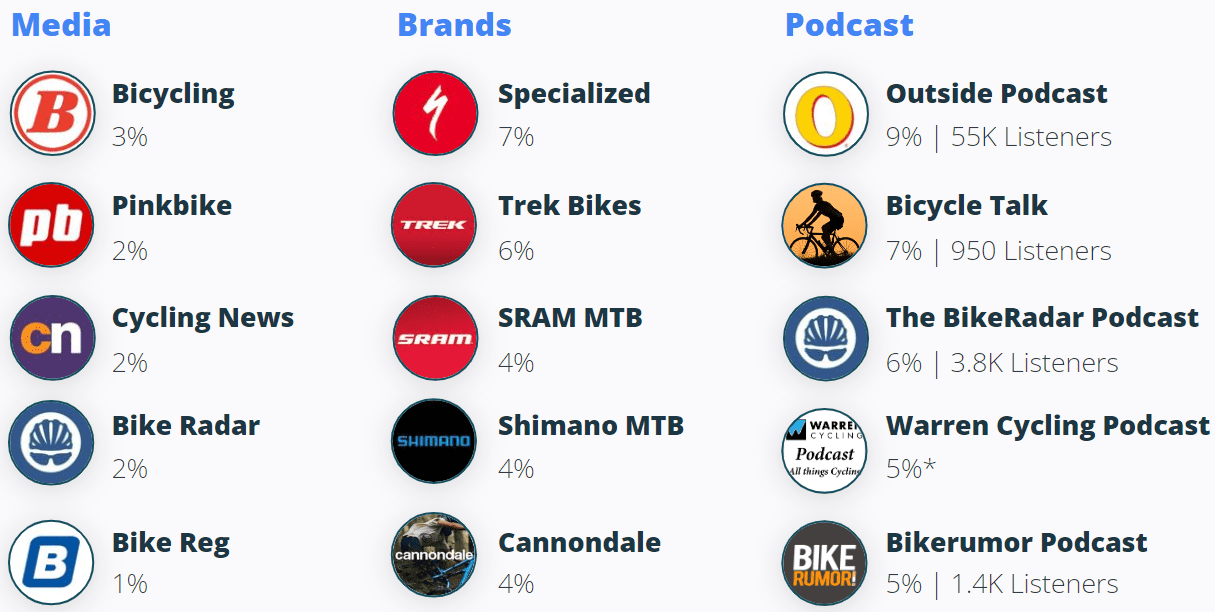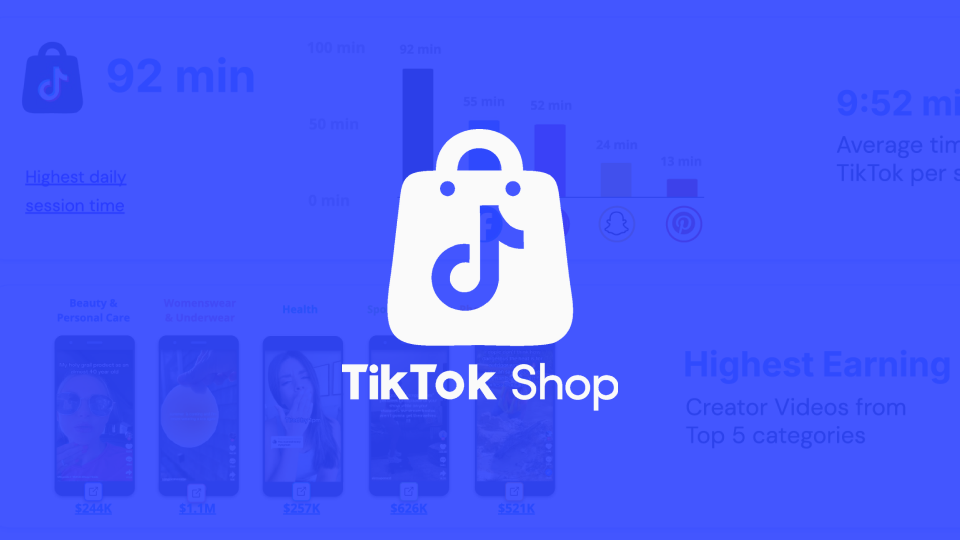
Everything You Need to Know About the All-Mountain Biking Audience
Purpose of This Research
Identify interests and behavioural attributes of the all-mountain biking audience by pulling data and insights about people who:
- Talk about mountain biking online
- Talk about learning mountain biking online
While pulling insights to understand more about:
- Women and mountain biking
- Buyer habits with bikes over time
- Social initiatives and interests of the community

Audience Key Takeaways


Affinity Key Takeaways
Specialized, Santa Cruz and Trek have seen the highest search interest for MTB product.
- Recommendations
However, Specialized, Rocky Mountain and YT Industries are the only brands seeing YoY interest growth.
This audience is socially conscious, athletic and art & culture-forward. Adventure (86%), Social Causes (66%) and Art & Culture (59%) are their top interest categories.
- Recommendations
(i) Partner with mountain biking and cross-discipline biking media companies and podcasts, the audience engages with this content.
(ii) This audience is made of year-round adventurers. Make yourself visible at parks & resorts they visit throughout the year.
(iii) Environment & human welfare is important to this audience. Partner with accessibility organizations (aiming to give more people a chance to try MTB) and environmental organizations.
(iv) Be a guide and source of community for this audience that often seeks external help to plan routes and accesses training advice.
(iii) Use proximity to local trails as a selling point for this audience. They love to travel, reach them through their favourite travel guides.



Specialized, Rocky Mountain and YT Industries are the only brands growing in MTB interest during in-season periods (March to August).


Only Santa Cruz and Yeti saw decreases in interest after COVID compared to before. Rocky Mountain saw the most overall growth.
Percentage of growth compares pre-COVID to post-COVID interest to avoid the inflation of bike interest during the COVID period.


Men just surpass women in the average amount of mountain bikers, but more women are beginning to learn how to ride.


General and new MTB riders are typically in the 26-50 age range, while female riders skew higher in the 36-50 age range.


This audience leans centre-left in their political affiliations.


Most mountain bikers have a bachelor degree, with only roughly 16% continuing on to pursue higher education.

24% of the sample’s education status is unknown.

Build new to MTB and women-led MTB groups near West Coast stores.
There is also interest building in East Coast regions (could be leveraged for East Coasters traveling West for vacations).

*Canadian locations not represented on map.

Target people in Business & Technology as well as service-oriented jobs like Teaching and Healthcare.




This audience is socially conscious, athletic and art & culture-forward.
The percentage represents the share of interests people who talk about MTB have:


Partner with mountain biking and cross-discipline biking media companies and podcasts, the audience engages with this content.
The percentage represents the share of affinities people who talk about MTB have:

*Listeners not available.

This audience is made of year-round adventurers. Make yourself visible at parks & resorts they visit throughout the year.
The percentage represents the share of affinities people who talk about MTB have:


Partner with accessibility organizations (aiming to give more people a chance to try MTB) and environmental organizations.
The percentage represents the share of affinities people who talk about MTB have:


Be a guide and source of community for this audience that often seeks external help to plan routes and access training advice.
The percentage represents the share of affinities people who talk about MTB have:
- Create a challenge with communities riding local trials near your locations to incentivize store visits.
- If you want to make riding more accessible, think about ways you can get prospects involved with a low barrier to entry like sponsored guides about what you need to start mountain biking or ways you can prepare for a day of riding.


Use proximity to local trails as a selling point for this audience. They love to travel, reach them through their favourite travel guides.
The percentage represents the share of affinities people who talk about MTB have:
- Reach people travelling across the states or within North America to promote trails near you with the intention of promoting bike rentals for people who can’t bring theirs with them while travelling.
- “Only in Your State” is a great publication to focus nature-based messaging on, as they often highlight the natural wonders of different American regions.




People switch out their bikes every ~5 years or every 10+ years.
Pre-COVID, a majority of people discussed switching out bikes frequently, but have adjusted their strategy since.

*Discussion based on reddit forums in r/MTB

Quality and versatility are priorities for this audience.
Frequent Buyers
Some buyers who make purchases every 2 years or so are willing to pay ~$5K for their bikes if it means they don’t have to invest in any upgrades.
They want to maximize their time on the bike and then prepare to sell again in ~2 years.
- Use messaging to communicate that your bikes are high quality and ready to ride. Show the audience they don’t need to invest further on additional upgrades to have a good ride.
Bike ‘Collectors’
Riders who don’t sell their old bikes to refinance new purchases are adamant about keeping their bikes as long as they have storage for them.
‘Collectors’ like keeping their bikes for two main reasons:
(i) To have all-around versatility (ie. each bike serves a different purpose on different terrain or ability).
(ii) To make a bike available for friends or family who might want to get into the sport but don’t know where to start.
Decision Making
People use the following factors to decide when or what bike to buy:
(i) How versatile is the investment in their riding? Will it just cannibalize bikes they already own?
(ii) Experience-level. As they continue to ride is their bike meeting the demands of more intense trails they want to try?
(iii) People adjust their bikes based on where they live and/or are moving.

Serious riders evolve with their bikes. Meet bikers at different stages of their buying and biking journey.


Newbies to the sport seek out advice on misconceptions about serious MTB injuries and where to ride.
Newcomers are looking for reassurance about riding levels and the pace that people can go at.

Riders suggest that newbies to look into biking groups and trail rides hosted by the IMBA (International Mountain Bicycling Association).


Create fact-driven, versatile guides to explain the options women have for bikes, especially if they are shorter than the average biker.
People want to know if “women’s” bikes are a scam or relevant.

- There’s a misunderstanding of what the true benefit is to a ‘women’s’ bike. They want to know if there is actually a difference beyond “feminine” colours and details.
- Emphasize ‘ride out’ or demo days hosted for women to ease new riders or existing riders who are struggling with sizing to get a hands-on feel for the product.
There’s a between-sizes problem, as well as many questions around the topic of shorter women or women with short legs and long torsos.


Partner with women’s riding groups, they’re a major source of community that lowers the barrier to entry for new female riders.


Bring people together in your store regions to help women, LGBTQ+ and BIPOC communities experiment with the sport to see if they like it.
Partner with organizations that have already started to establish themselves in this area like:


Numbers represent search interest relative to the highest point on the chart for the given region and time. A value of 100 is the peak popularity for the term.
Data based on sample of 86K people who talk about ‘mountain biking’ online.
Complimentary Strategy Session
Take the next step in your market planning. Request your free strategy session today.
Book Your Session →














